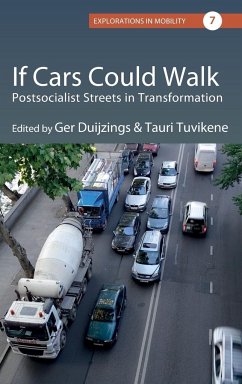In the last twenty-five years, the explosive rise of car mobility has transformed street life in postsocialist cities. Whereas previously the social fabric of these cities ran on socialist modes of mobility, they are now overtaken by a culture of privately owned cars. If Cars Could Walk uses ethnographic cases studies documenting these changes in terms of street interaction, vehicles used, and the parameters of speed, maneuverability, and cultural and symbolic values. The altered reality of people's movements, replacing public transport, bicycles and other former 'socialist' modes of mobility with privatized mobility reflect an evolving political and cultural imagination, which in turn shapes their current political reality.
Hinweis: Dieser Artikel kann nur an eine deutsche Lieferadresse ausgeliefert werden.
Hinweis: Dieser Artikel kann nur an eine deutsche Lieferadresse ausgeliefert werden.








